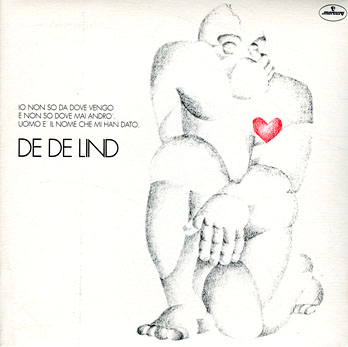
Week of December 2, 2007

Personnel:
Matteo Vitolli - guitar, flute
Gilberto Trama - flute, sax, keyboards
Vito Paradiso - vocals, guitar
Eddy Lorigiola - bass
Ricky Rebajoli - drums
Album:
Io Non So Da Dove Vengo E Non So Dove Mai Andro. Uomo E'Il Nome Che Mi Han
Dato, 1973 Mercury 6323 901
CD: Mercury (846 414-2) 1992; Vinyl Magic VM CD 083. Also in Japan and South
Korea

If one masterpiece should be singled out as the jewel of Italian rock, my
vote would go to De De Lind's one and only album, which also wins the
competition for the longest title. What is so special about it? I will try to
explain this by the way of a short analysis.
The music of De De Lind has an otherworldly combination of poetic beauty,
dynamic range, a considerable philosophical depth and, most of all, strong
passion. The whole album forms a united work whose name translated to English is
'I don't know where I'm coming from and I don't know where I will go to. Man is
the name I was given.' The album starts in heavy blues-rock style with
psychedelic undertones and
Jethro Tull-like
flute lines. This gives no indication of which way the album will develop, but
already reveals a vocalist with extraordinary intensity and commitment. This
rather powerful introduction suddenly calms down followed by an unsuspected
modulation of key (one semitone up) after 5:12 minutes, lifting the music to a
higher dimension of pure beauty with flute and acoustic guitar playing
meditative and dreamy tones. However, after 6:12 minutes the flute melody fails
to reach its harmonic conclusion. Instead the mood becomes more dramatic with
vocalist Vito Paradiso anxiously singing a section with increasing volume! Then
the flute makes another attempt with the same melody, succeeding in reaching a
harmonic conclusion this time. The reward is a quick crescendo into a full rock
band sound, in which the majestic main melodic theme of the album (carried by
the electric guitars) is revealed. It's regal and powerful with strong
psychedelic overtones. This theme is repeated with some variations, including
additional vocals.
The third section of the album ("Paura Del Niente") starts with melodic
material contrasting the main theme. The sung melody is soft and mellow in
nature. This provokes (after a moment of complete silence) a sharp instrumental
reaction with furious flute playing and angry guitars. For the rest of the
section there are various instrumental developments. Section four ("Smarrimento")
starts with an angry solo flute melody in the best Ian Anderson "Locomotive
Breath" style. Some inspired flute variations gradually invite the whole
band to play the powerful reaction from "Paura Del Niente". A heavenly
section of acoustic guitar and vocals follows. Then there are further dynamic
variations, including a reprise of previously played melodies. Section five ("Cimitero
Di Guerra") ends with the full band treatment of the first flute melody from
"Smarrimento". Section six ("Voglia Di Rivivere") starts in a very
thoughtful and dreamy mood with many melodic references to the main theme of the
album. This returns at last in its full glory in a marvellous full-blooded
onslaught. Unexpectedly, this satisfactory conclusion is not completed and the
last section follows.
Section seven ("E Poi") is a kind of epilogue, obscuring the previous
feeling of fulfilment. The lyrics in this section are the long title of the
album. In this way, the album ends by referring to the meaning of its title.
Luckily, the group made no further albums - they would only have been painful
anticlimaxes to what they had already done.
Taken from Scented Gardens of the Mind - A guide to the Golden Era of Progressive Rock (1968-1980) in more than 20 European Countries, by Dag Erik Asbjørnsen, Borderline Productions, ISBN 1-899855-12-2